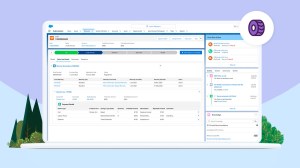Imagine you’re at a restaurant, and suddenly your throat feels itchy your breathing becomes labored. You catch a glimpse of yourself in the mirror, and realize your cheeks have swollen and broken out into hives. Something you ate was cooked in peanut oil. Without an epipen on you, you end up at the emergency room. Your primary care doctor knows you are allergic to nuts, and has an electronic healthcare record (EHR) that captures your history of similar episodes, but the nurse treating you does not have access to it. Between each gasp for breath, you’re asked to recount the same basic information outlined in your EHR, creating a frustrating experience for you and your medical practitioner alike.
What’s lacking in this patient experience is interoperability—the process of operationalizing patient care by ensuring technologies connect with each other to share data within and outside of organizational boundaries. Without computerized systems that connect, engage and interpret data while automating workflows, it’s difficult to have a complete and holistic view of patients across key stakeholders in the healthcare continuum. For patients, that means having to repeatedly share prior medical history. For providers, not having a singular view of a patient makes it harder to ensure safe and accurate care.
“When the healthcare industry is connected, our world’s healthcare professionals, payers and researchers can quickly and more efficiently provide services and information that can heal ailments, inform others and ultimately engage healthcare consumers to achieve our shared mission: keeping people healthy,” says Ashwini Zenooz, Salesforce Chief Medical Officer and Senior Vice President, Healthcare and Life Sciences.
Back in 2015, Salesforce began developing Health Cloud to enable care teams to collaborate more efficiently, understand patients and members more deeply, and build stronger relationships across care journeys—and we continue to iterate on the platform, as evidenced with today’s launch of Provider Relationship Management and Einstein Analytics for Health Cloud.
With Health Cloud, Salesforce strives to enhance the patient’s experience of care while easing the healthcare system’s coordination of care. Connecting technologies and disparate EHR systems requires seamless integration, which is where MuleSoft comes in. MuleSoft is a critical component for our interoperability strategy, enabling API-led connectivity and an enhanced 360-degree view of patients. Also essential to solving for lack of interoperability, Salesforce partners develop solutions on top of Health Cloud that further propel the industry forward.
Today Salesforce ISV and Mulesoft partner Bridge Connector launched Destinations on Salesforce AppExchange, the world’s leading enterprise cloud marketplace. Destinations is a no-code healthcare interoperability solution that enables organizations to quickly and easily integrate disparate health care applications with Health Cloud. Bridge Connector is working together with MuleSoft to synchronize patient data across Salesforce and third-party systems with API-led connectivity.
“Salesforce’s approach to interoperability allows us to drive a better patient experience across the healthcare ecosystem,” says Zenooz, “Our interoperability capabilities extend the value of the EHR, and we do this by enabling digital, omni-channel connections to the patient, allowing better and on-going collaboration—and our partner ecosystem is crucial to the solutions we bring to our healthcare and life sciences customers.”
According to Zenooz, the most important challenge that interoperability is solving for is the difficulty of ensuring safe care. A study by Epocrates found that 95% of physicians have reported delaying delivering care because patient data was not accessible. If providers aren’t able to access the entirety of a patients’ health information, there’s a greater risk of an adverse event. A Johns Hopkins study suggested medical errors are the third leading cause of death in the U.S., with errors in part due to poorly coordinated care and fragmented insurance networks.
Interoperability is also crucial to overcoming poor patient experience and lack of patient access to their own medical records, which contributes to the burden of treatment. As a patient, just think about how many times you’ve had to repeat the same basic information about yourself to caregivers even within the same organization, maybe even on the same day. Lack of interoperability ultimately burdens both the patient and provider; it can lead to duplicative work and services, contributing to the massive costs and administrative burden our healthcare systems face.
“Healthcare, and even interoperability in healthcare, is much too large a problem for any one company to solve. Being part of a partner ecosystem has connected us to other companies that are driven and passionate about solving problems in healthcare, allowing us to take a ‘better together’ approach to be more impactful.” says Josh Douglas, Bridge Connector Chief Technology Officer. “This has allowed us to focus on our specific strong suit, which is interoperability and integration, and then partner with other people in the ecosystem to elevate what they do really well to solve that larger problem.”

When we look at the healthcare landscape, part of Salesforce’s approach is understanding customer opportunities and gaps. If there is whitespace and we can’t solve it ourselves, we look to innovative partners to fill in the spaces we are missing. These partners, like Bridge Connector, develop solutions on Salesforce AppExchange—the world’s leading enterprise cloud marketplace—that improve outcomes and value for customers and their patients.
“With AppExchange, we provide our customers with a catalog of third-party solutions that address any number of business problems and patient challenges in the healthcare space,” says Woodson Martin, Salesforce General Manager and Senior Vice President, AppExchange. “The fundamental value proposition of AppExchange is not only that it enables our trailblazers to innovate in patient experience, but they can benefit from our vast and growing ecosystem. Partners like Bridge Connector, with their no-code integration into EHR records, are providing extensions to Health Cloud to make healthcare trailblazers more successful and deliver better experiences and better outcomes for patients.”
Envision a future where interoperability is ubiquitous—where any healthcare practitioner, anywhere, could have secure access to your EHR at the click of a button. While that may be a utopian notion, the continued collaboration and innovation of the Salesforce ecosystem will certainly bring us closer to a more connected patient experience.
For more on the latest in Salesforce healthcare innovations, check out our latest announcement.



















